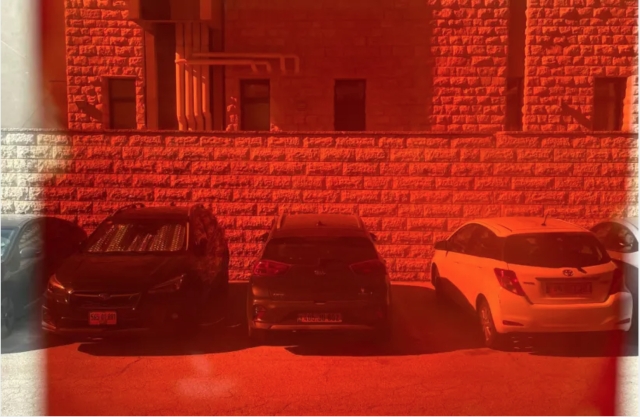The professor who invented the cherry tomato is now developing new technology that will completely change the entire agricultural and energy-producing industries. Professor. Chaim Rabinowitch is leading a project that is already successfully brewing in his laboratory, a thin glass solar panel with a red coating that will be able to be placed over large agricultural areas, will allow the plants to absorb the sunlight it needs while using the remaining sunlight for creating solar energy.
Professor Rabinowitch told the Israeli newspaper “Calcalist" that his idea came from a young man wearing shiny sunglasses who passed by him on the street. "I looked at this man and I said to myself: wait, he uses part of the light to see, and the other part returns to the environment and is lost, just as the plant only needs a tenth of the amount of light for the photosynthesis process. Why don't we use this lost light to produce electricity?"
@HebrewU 's Prof. @lioz Etgar and Prof. Haim Rabinowitch have developed a semi-transparent solar panel tech that is implementable in greenhouses providing energy and photosynthesis.
— Yissum HUJI (@yissumhuji) December 22, 2022
Read more in this @Jerusalem_Post article: https://t.co/a2tUG9XMf9#RenewableEnergy #SolarCells
Rabinovitch, a professor from the Faculty of Agriculture, Food and Environment at the Hebrew University, shared his idea with Professor Lioz Etgar from the University's Chemistry Institute, and together they developed a prototype of an innovative solar panel, designed to fully cover agricultural areas such as greenhouses, orchards and even water reservoirs in a way that will allow electricity generation without harming the light reaching the greenhouse crops, and without usurping open spaces.
The solar cell developed by the two is based on a perovskite crystal that is produced in a simple and relatively easy process from cheap and readily available materials using a method similar to paper printing, in contrast to the solar cells that are used around the world today, which require the mining of precious metals and a complex manufacturing process. "We don't use silicon," they explained, "the main substrate is glass and cheaper materials. The cost of producing the panels is cut in half in comparison with others, and there is no need for huge factories. It can be produced locally in a simpler manner."
While depicting all of Israel as the imaginary "#Palestine" (located north of "Neverland") the PA completely misses the fact cherry tomatoes were developed by Nahum Kedar & Chaim Rabinovitch of the Agriculture Faculty of the Hebrew University of Jerusalem on its Rehovot Campus 🇮🇱 https://t.co/V6Uo1arNE0
— Maurice Hirsch, Adv. 🇮🇱 עו''ד מוריס הירש (@MauriceHirsch4) March 13, 2022
The development that the two are working on at the Hebrew University will allow plants to receive the amount of light they need for photosynthesis, and the rest of the light will be used to produce electricity. "It is clear to everyone that the energy in the agricultural greenhouses has been wasted for years," says Prof. Etgar. "Our solution maximizes up to three times the production of solar electricity in the growing areas and also reduces the thermal impact on the plants and their water consumption. Covering fields with such panels can also protect the plants from forces of nature."
We’re at Kibbutz Ketura today in the Negive desert 🐪 on the southern end of Israel 🇮🇱 looking at Date palms, algae, automated solar panel cleaning for 15% better efficiency, Argan nut oil extraction, & more with only a 20ml per annum average rainfall. @theGRDC @nuffieldaust pic.twitter.com/TZlIqe7nf3
— Jarrod Amery (@JarrodAmery) June 28, 2022
According to the researchers, the development’s effectiveness has been technologically proven in the laboratory and will reduce the cost of energy in Israel by 75%. At the same time it will reduce farmers' expenses and increase their incomes, and of course - will help the Jewish country achieve its goals of transitioning to renewable energy.


